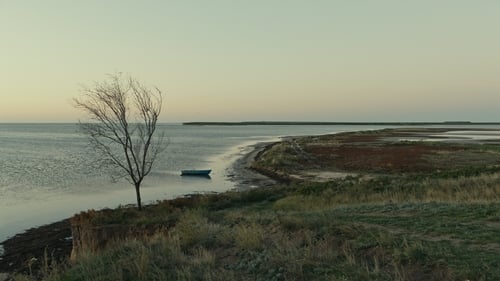Akhtem Seitablaiev
出生 : 1972-12-11, Yangiyul, USSR (Uzbekistan)

Director
The story of trust and its absence against the background of events unfolding in Eastern Ukraine in early 2014. The main topic is revealed through the prism of the Luhansk border base, whose fighters the separatists and Russian special services tried unsuccessfully force to betray their country.

Self (the expert)
A documentary film about the rise of Ukrainian cinema both at the national level and on the international stage.

Doctor
Pianist-adventurer Misha gets a job with the old owner of a mysterious house-quest. But he does not know that the question "WHERE IS THE MONEY?" interested not only in him. Everyone in this house is looking for money.

Andrii Hryshchuk
A historical drama dedicated to Ivan Franko's son Peter, who lived a life full of achievements and adventures.

doctor
As a result of a terrible car accident, young Ukrainian athlete Oksana Boturchuk suffers several serious injuries, almost losing her eyesight. However, after long rehabilitation and a returning to incredible training, she is able to conquer a gold medal at the Paralympic Games in Beijing.

Self
How does war resonate in a peaceful life? How does it melt in the mind of a creative person? In the documentary film "Wind from East" the authors are looking for answers to these questions. In the picture, the two worlds are peace and war, but peace is a theater where preparatory rehearsal work takes place, and war is also a theater, but at war. There is another world that stands alone - it is a play played by actors, rethinking their own experience of involvement in the war and the texts of Alexander Dovzhenko and contemporary Ukrainian authors. These worlds combine interviews with people, with those who joined the actors' trips to the east, with the military, who received the actors and became spectators directly on the front line.

Oleksii
Alex, an experienced surgeon, makes a mistake in the diagnosis of his seven-year-old godson. The boy dies on the operating table. Stunned, the man tenders his resignation. One autumn morning he is sitting on the riverbank in a favourite place where he used to fish with his godson. Suddenly he notices the figure of a shapely semi-naked girl emerging from the fog. She is shivering with cold. Alex spontaneously offers his help, and thus becomes part of an incredible adventure story.

Director
Ten figures walk around in a circle. All they have is a number. The “Great Zero” monitors them. Based on a dystopian parable by Oleg Sentsov, this film was created between Kyiv and the Siberian penal colony where Sentsov spent five years as a political prisoner.

Mustafa, father
A father and a son from Crimean Tatar family transport the body of deceased older son and brother from Kyiv to bury him in Crimea.

Director
During the 13th century, a small village fights for freedom in the frontier landscape of the Carpathian Mountains against Mongolian invaders.

Director
‘The Cyborgs’ is re-telling the recent history of Ukraine – the legendary fight for Donetsk Airport in 2014 during Russian invasion. The freedom fighters from various divisions of Ukrainian army and volunteer battalions took a 242-days stand against the Russian backed militants until the complete destruction of the airport’s terminal.

Director
Nazi-occupied Crimea, 1944. A boy named Itzhak turns to Saide Arifova, a local Tatar Muslim woman, for help, explaining that he and a group of other Jewish orphans are hiding from the Nazis. Arifova faces a moral dilemma: should she try to help them or save herself by refusing? Despite the impending danger, she decides to protect the children by hiding them in plain sight, and disguising them as Tatars and adopting them into the local community.

Nazi-occupied Crimea, 1944. A boy named Itzhak turns to Saide Arifova, a local Tatar Muslim woman, for help, explaining that he and a group of other Jewish orphans are hiding from the Nazis. Arifova faces a moral dilemma: should she try to help them or save herself by refusing? Despite the impending danger, she decides to protect the children by hiding them in plain sight, and disguising them as Tatars and adopting them into the local community.

Man in Black
Film tells an exciting story of a confrontation between talented boxer and criminal patrons of mixed fights MMA.

Two fellow athletes fall in love with the same girl. They try to get money for her treatment for cancer.

Амет-Хан Султан
The film tells about the tragic date in the history of the Crimean Tatar people — May 18, 1944 — Stalin’s deportation of the Crimean Tatars. The plot of the film — a pilot, twice Hero of the Soviet Union, Amethan Sultan. In May, 1944, a year after liberation of Sevastopol Amethan goes on vacation to his native town Alupka. On May 18 his eyes witness begining of deportation of the Crimean Tatars.

Director
The film tells about the tragic date in the history of the Crimean Tatar people — May 18, 1944 — Stalin’s deportation of the Crimean Tatars. The plot of the film — a pilot, twice Hero of the Soviet Union, Amethan Sultan. In May, 1944, a year after liberation of Sevastopol Amethan goes on vacation to his native town Alupka. On May 18 his eyes witness begining of deportation of the Crimean Tatars.

Director
An aging composer, caressed by fame, realizes that his finest hour has passed. And in his troubles, the creator blames first of all his wife Elena. To return the capricious muse, Eugene brings a young mistress, a student of the conservatory, into the house. And the wife has to put up with the fact that from now on she will live under the same roof with the "doves."

Based on Mykhailo Kotsyubynsky's "Crimean Stories": "In the Shackles of Satan", "On the Stone" and "Under the Minarets".

Tatar warrior
Mamay draws on traditional Ukranian and Tatar folktales for its Romeo and Juliet-like love story and parable about chivalry and the struggle for freedom. Hundreds of years ago, in the wild steppes of Crimea that form an uneasy border between East and West, Europe and Asia, nomad and farmer, the proud Cossack Mamay falls in love with the Tatar beauty Omai. The title, like the storyline, holds a variety of different meanings taken from different cultures. In Turkic languages, it means "no one," but it was also the name of a famous Mongol conqueror, the great grandson of Ghengis-Khan. In Persian legends, mamay literally means "the spirit of the steppes. "



















